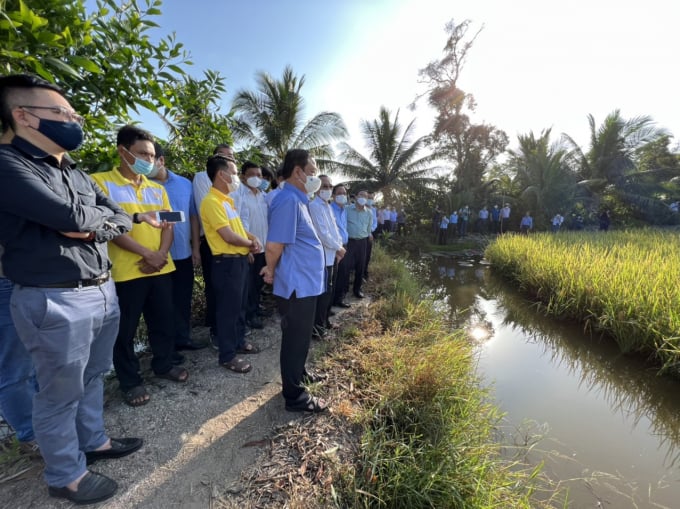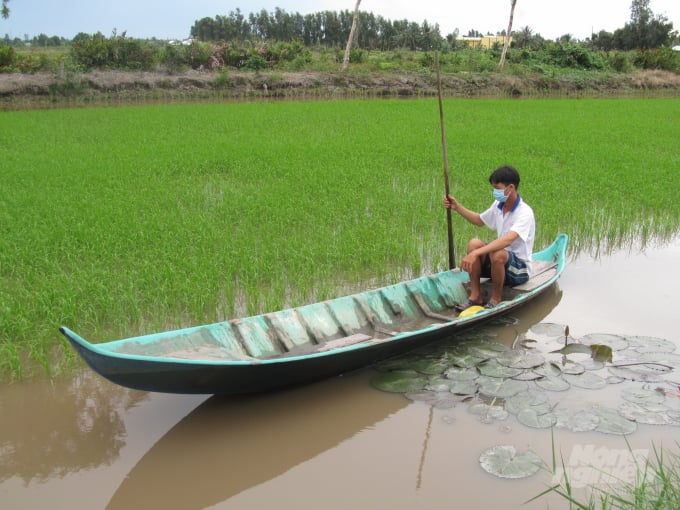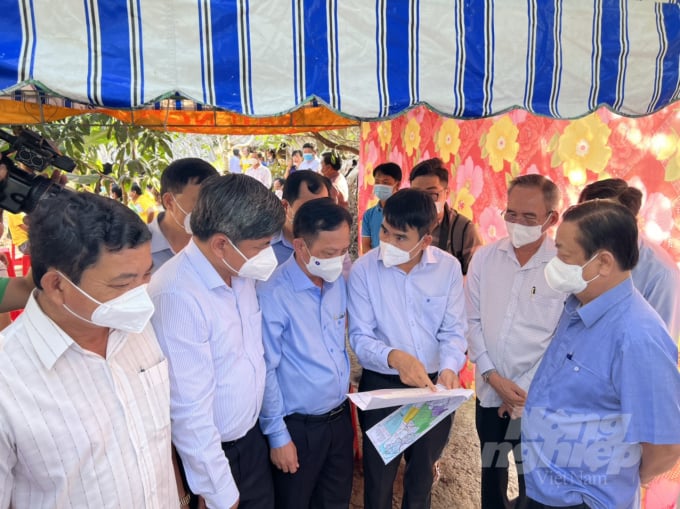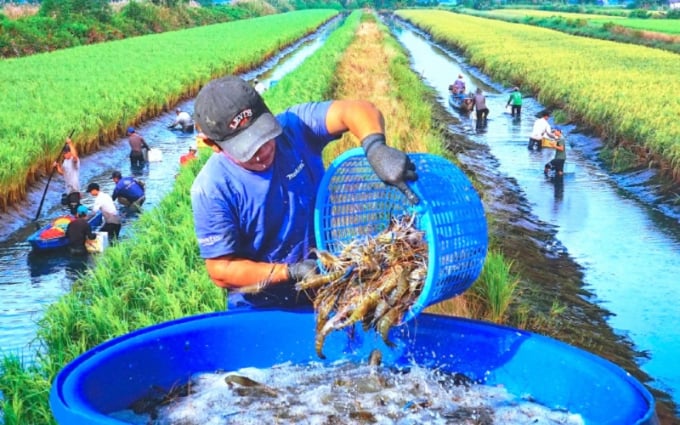May 17, 2025 | 06:20 GMT +7
May 17, 2025 | 06:20 GMT +7
Hotline: 0913.378.918
May 17, 2025 | 06:20 GMT +7
Hotline: 0913.378.918

Minister Le Minh Hoan visits a rice-shrimp model in Hong Dan District, Bac Lieu Province. Photo: Trong Linh.
Farmer Pham Chi Men (Nam Quy hamlet, Dong Thai Commune, An Bien District, Kien Giang Province) said: “Previously, the family produced ordinary rice, then Engineer Ho Quang Cua came to help replicate the ST rice growing model. After some crops, the rice average yield of was about 6-7 tons/ha and since then the model has been applied until now. The rice is always purchased by traders at a high price.”
"Now, wherever I go, I encourage people to plant ST rice varieties. So far, most people in Nam Quy hamlet use ST rice varieties of Engineer Ho Quang Cua. In addition, farmers also combine raising shrimp in rice fields, earning a total profit of about VND100 million/ha/year," said Men excitedly.
Meanwhile, farmer Pham Van Hai (Ta Suol hamlet, Loc Ninh Commune, Hong Dan District, Bac Lieu Province) said: “The rice-shrimp model has become a main source of income. As before, farmers' income only depended on 1 rice crop/year but now they can earn more from shrimp. The rice-shrimp model is really a smart production form in the current conditions that crops must be adapted to the current drought and salinity."
Seeing the real effects of the rice-shrimp model, many farmers have continuously expanded their growing areas. In Bac Lieu, the shrimp-rice area in 2001 was only about 6,000ha, but by 2021, it has increased to nearly 40,000ha, accounting for 34% of the total shrimp farming area in the province.

The shrimp-rice model is regarded as a sustainable, efficient, smart production adapting well to climate change. Photo: Trong Linh.
Assoc. Dr. Duong Nhut Long, Lecturer at Can Tho University shared: “The giant river prawn has high ability of adaption to climate change. Through the process of shrimp-rice model study in Bac Lieu, it shows can give an average profit of about VND90 million/ha/year. It especially reaches up to VND130 million/ha/year in An Bien District, Kien Giang Province.
Mr. Pham Van Thieu, Chairman of Bac Lieu Provincial People's Committee said: “With diverse climate, land and water resources, Bac Lieu is very favorable for developing agriculture in general, and aquaculture, in particular."
Currently, Bac Lieu has over 140,000ha of aquacultural area, with many types of production. The province has the second-highest yield of shrimps in the country and the largest scale of breed production in the Mekong Delta. Especially, a model of super-intensive high-tech shrimp farming has also been implemented in this province with a yield of 10-15 times higher than that of ordinary farming.
The rice-shrimp growing has increased year by year in terms of area, productivity, and added value. This is a sustainable development model that can bring in a profit of 15 - 30% higher than that of rice monoculture. Many enterprises have linked their production activities (clean shrimp raising, ecological farming, fragrant high-quality rice growing…) with cooperatives, cooperative groups, and farmers.
The shrimp-rice model has progressively boosted the application of new technological advances and helped create a safe and stable ecosystem and environment, conducive to shrimp farming and sustainable rice growing, providing safe products to meet current consumption and export demands.
Mr. Le Van Su, Vice Chairman of Ca Mau Provincial People's Committee said: “Like some coastal provinces in the Mekong Delta, Ca Mau has a fairly large area for aquaculture development, rotating one rice crop and one shrimp crop. It has the advantage of developing shrimp farming in rotation on a stable production area of about 35,000ha.
“Evaluation through many years has showed the rice-shrimp rotation model has averagely yielded about 4-4.5 tons/ha for shrimp, and 4-4.5 tons/ha for rice. In addition, in Ca Mau’s northern region, giant freshwater prawn has been grown on an area of 15,000-18,000ha bringing a total income of VND60-80 million/ha/year for farmers," said Mr. Su.
Ms. Nguyen Thi Hang, General Director of Bo De Group said: “In Bac Lieu, a project on farmers’ ‘professionalization’ has been implemented since 2018. Participating in this project, farmers are equipped with scientific and technical knowledge and trained in technology transfer. The Group helps farmers build a production model following the biological process to create safe and environmentally friendly products through the use of materials extracted by Bo De technology.”

Minister Le Minh Hoan (first right) visits local rice - shrimp production units in Bac Lieu. Photo: Trong Linh.
“In addition, Bo De Group also trains farmers with knowledge and thinking to join in the market economy, creating a community-based production environment with a focus on protecting the ecological environment through the application of biotechnological process", Ms. Hang added.
Mr. Huynh Van Thon, Chairman of Loc Troi Group said: “Currently, the Group is implementing close linkages with cooperatives in the Mekong Delta in the production of commodity rice, including the rice-shrimp model. Loc Troi focuses on supporting, transferring techniques to farmers, helping them change cultivation customs, on the basis of cooperation, and profit-sharing...”
“In the past, production on large-scale fields was failed due to lax management, but now we do it more closely by establishing cooperatives,” said Mr. Thon.
Mr. Nguyen Van Phong, Director of An Khang Agricultural Service Cooperative (Ninh Quoi A Commune, Hong Dan District, Bac Lieu), said: “An Khang Cooperative was established in July 2020, with 49 members. With the goal of producing high-quality, sustainable, and environmentally-friendly rice, it has actively linked production with Loc Troi Group which supplies it with input materials and consumes products. This production linkage trend is now applied by many cooperatives in the Mekong Delta.

The rice-shrimp model has changed farmers' production thinking towards multi-value integration in the Mekong Delta. Photo: NNVN.
During a recent visit to some areas with production linkages, especially rice-shrimp farming in the Mekong Delta provinces, Minister of Agriculture and Rural Development (MARD) Le Minh Hoan emphasized: “For a long time, farmers have only paid attention to tangible values, rather than intangible ones, so they have not fully exploited the potential and benefits from production. Therefore, if people integrate intangible values turning them into tangible values, they will create more new valuable products with high economic benefits.”
"In the past, a single value form was developing in rice and shrimp industries, but with the current rice-shrimp model, these two industries will integrate together. Although it is only applied in Bac Lieu, Ca Mau, Soc Trang, and Kien Giang, it proves that it has adapted very quickly to climate change.
Currently, farmers have adopted to change their production thinking businesses through support from experts and scientists. All changes will be difficult at first, but if they don't change, the difficulties will pile up even more in the current context," the MARD Minister stressed.
Translated by Trang Nguyen

(VAN) Cold-barn systems efficiently manage environmental and temperature conditions, which aids in the prevention of respiratory diseases in pigs and protects them from the vectors that transmit African swine fevers.

(VAN) To tackle challenges, the project 'Addressing key technical bottlenecks in the grouper supply chain in Vietnam' has been underway since 2024.

(VAN) The project 'Disease-Resilient and Sustainable Cassava Production Systems in the Mekong Region', funded by the Australian Center for International Agricultural Research (ACIAR), is being implemented from 2024 to 2028.

(VAN) Data from 10,000 farming households will help professionalize production organization and support the implementation of the One Million Hectares Program for High-Quality, Low-Emission Rice Cultivation.

(VAN) FAO Director-General QU Dongyu marks International Day of Plant Health at NENA conference.

(VAN) Deputy Minister of Agriculture and Environment Hoang Trung affirmed that floriculture and ornamental plants are a growing industry that receives significant global attention.

(VAN) The three staple crops dominating modern diets – corn, rice and wheat – are familiar to Americans. However, fourth place is held by a dark horse: cassava.